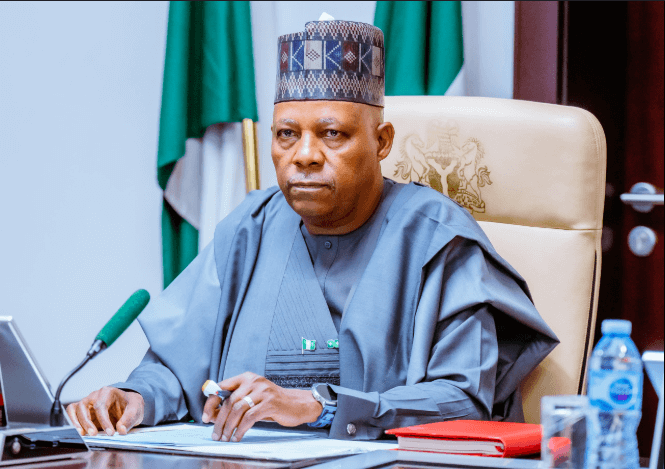Let’s talk about words, power, and the fragile dance between politicians and the press. This week, a book launch – normally a staid affair of backslaps and platitudes – detonated into a full-blown war of narratives involving Nigeria’s Vice President, Kashim Shettima, and a section of the media. The battleground? A single passage in his speech. The casualty? Trust, once again.
The Office of the Vice President isn’t just displeased; they’re incensed. In a stern statement released yesterday, they slammed what they call the “gross misrepresentation” and “irresponsible twisting” of VP Shettima’s comments during the presentation of Mohammed Bello Adoke’s book, “OPL 245: The Inside Story of the $1.3 Billion Oil Block.” The core accusation? That certain media outlets deliberately contorted Shettima’s recounting of a deeply sensitive historical moment: an alleged attempt by the administration of former President Goodluck Jonathan to remove him from office while he was Governor of Borno State.
“Sensational reporting disappointingly tried to erect a highly mendacious argument,” the VP’s statement charges, cutting off mid-sentence with palpable frustration. That truncated phrase speaks volumes about the temperature in Aso Rock.
So, What Did the VP Actually Say?
According to multiple attendees I spoke with (including two senior journalists from different outlets who requested anonymity due to the sensitivity), Shettima, while discussing the intense pressure and political maneuvering during the peak of the Boko Haram insurgency in the North East, referenced a period where he felt targeted. His remarks, framed as part of the broader “inside story” context of the book (which delves into the notoriously murky Malabu oil deal), reportedly touched upon feeling undermined or pressured to step aside by the then-federal government during the crisis. He framed it as an example of the complex political challenges faced by leaders in conflict zones.
Where Did the “Twist” Happen?
The Vice President’s office contends that some reports isolated this remark, stripping it of its historical and contextual moorings, and presented it as either:
- A direct, unprovoked attack on former President Jonathan: Framing it as Shettima reigniting old political feuds unnecessarily.
- A sensational “revelation” of a coup plot: Implying a literal, illegal attempt to oust him, rather than potential political pressure or maneuvering.
- Distracting from the book’s focus (OPL 245): Shifting the narrative away from Adoke’s account of the oil scandal towards Shettima’s personal political history.
One editor at a major online publication, who also wished to remain unnamed, pushed back slightly: “Look, the VP brought it up. It is news when a sitting Vice President alleges pressure to remove him from a crucial governorship during an insurgency. Our job is to report what he said. If the context was solely historical reflection, perhaps the VP’s delivery or emphasis didn’t fully convey that to all listeners.” This highlights the perennial tension: politician’s intent versus media interpretation and audience reception.
Why Does This Scratch Such a Raw Nerve?
Let’s be honest, this isn’t happening in a vacuum.
- The Ghosts of Jonathan vs. The North: The Jonathan era, particularly its handling of the Boko Haram insurgency and its frosty relationship with some Northern governors like Shettima, remains a deeply contentious chapter. Any perceived reopening of those wounds is explosive.
- The North East’s Unhealed Wounds: Borno State bore the horrific brunt of the insurgency. Shettima’s governorship during that period is foundational to his political identity. Allegations of federal interference touch a profound nerve for survivors and stakeholders in the region.
- The Perennial Media-Government Mistrust: This incident feeds the toxic cycle. Government sees “fake news” and malice; media sees spin control and attempts to stifle reporting. The public? Often left confused and cynical.
- The Shadow of OPL 245: Ironically, the actual subject of the book – a $1.3 billion oil deal synonymous with alleged corruption on a grand scale – risks being overshadowed by this spat. The VP’s office likely feels this tangential controversy detracts from the serious issues Adoke’s book attempts to address.
The Unanswered Questions (The Investigative Angle):
The VP’s statement is strong on condemnation but light on specifics. To truly understand this clash, we need more:
- The Full Transcript: Will the VP’s office release the full, unedited transcript or video of his remarks? This is the only way to objectively judge context.
- Which Outlets? The statement decries “some news outlets.” Naming them would add weight to their accusation and allow for direct responses.
- The Jonathan Camp’s Response: What does former President Jonathan or key figures from his administration say about Shettima’s version of events? Silence speaks volumes, but so does a rebuttal.
- Corroboration: Are there other credible sources – former officials, advisors, contemporaneous documents – that can shed light on whether pressure was applied to Shettima during that critical 2014/2015 period?
The Takeaway: More Than Just Words
This isn’t just a spat over a speech. It’s a microcosm of Nigeria’s fraught political communication landscape. It touches on historical trauma, the ethics of reporting, the vulnerability of trust, and the immense difficulty of discussing painful national events without reigniting division.
The Vice President’s office feels maligned. Sections of the media feel they reported accurately. The public feels caught in the crossfire, perhaps wondering if anyone is truly focused on the massive issues – like the unresolved legacy of the OPL 245 scandal itself, or the ongoing security challenges that still plague the North East.
Until those specific questions are answered and the full context is laid bare, this controversy will fester. It serves as a stark reminder: in Nigeria, the past is never just the past, and words spoken from a podium can ignite fires long after the book launch applause has faded. The truth, as always, demands more than just competing statements; it demands evidence, transparency, and a willingness from all sides to engage beyond accusation.


